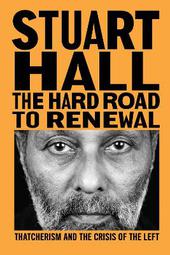
|
The Hard Road to Renewal: Thatcherism and the Crisis of the Left
Paperback / softback
Main Details
| Title |
The Hard Road to Renewal: Thatcherism and the Crisis of the Left
|
| Authors and Contributors |
By (author) Stuart Hall
|
| Physical Properties |
| Format:Paperback / softback | | Pages:304 | | Dimensions(mm): Height 210,Width 140 |
|
| Category/Genre | Literary essays
British and Irish History |
|---|
| ISBN/Barcode |
9781839761362
|
| Classifications | Dewey:335.00941 |
|---|
| Audience | |
|---|
|
Publishing Details |
| Publisher |
Verso Books
|
| Imprint |
Verso Books
|
| NZ Release Date |
3 August 2021 |
| Publication Country |
United Kingdom
|
Description
Stuart Hall was one of the most insightful and incisive critics of the Thatcher era. In this essential selection of his essays during the period, he elaborates both how Thatcher's rise to power exploited weakness in the left, but also how the left itself can refresh itself in the shadow of defeat. This collection is as vital today as it was in 1988. Through the essays Hall shows how Thatcher has exploited discontent with Labour's record in office and with aspects of the welfare state to devise a potent authoritarian, populist ideology. This ranges through the formation of the SDP, inner city riots, the Falklands War and the signficance of Antonio Gramsci. He suggests that Thatcherism is skillfully employing the restless and individualistic dynamic of consumer capitalism to promote a swingeing programme of 'regressive modernization'. In response he elaboraties a new politics for the Left as it is with the project of the Right. Hall insists that the Left can no longer trade on inherited politics and tradition. Socialists today must be as radical as modernity itself. Valuable pointers to a new politics are identified in the experience of feminism, the campaigns of the GLC and the world-wide response to Band Aid.
Author Biography
Stuart Hall was born in Kingston, Jamaica and educated at Oxford University. A pioneering cultural theorist, campaigner, and founding editor of the New Left Review, Hall was one of the most influential and adventurous thinkers of the last half century. He was Director of the University of Birmingham's Centre for Contemporary Cultural Studies from 1972, and from 1979 was Professor of Sociology at the Open University. His published work includes The Popular Arts, the co-authored volume Policing the Crisis, and his posthumous memoir Familiar Stranger.
ReviewsHall's metier was to tease out the competing histories, the contradictory political, economic, and social forces condensed within a particular historical moment, an excavation of ideology he called 'conjunctural analysis.' . . . [H]is work is all too timely, for the haphazard project of neoliberalism, justified retroactively by nonsensical appeals to the 'free market,' is as advanced as the decades-long economic decline it magics away with bubbles and rhetoric -- Michael Robbins, Bookforum * [For Selected Political Writings] * Hall's work has become especially resonant as Britain has voted for a narrower identity and a more isolationist attitude to the rest of the world.... There is a generosity and literary imagination in his writing-a recognition that humans are complex, contradictory creatures shaped by, among other things, what they believe, where they live, how they shop, and who they sleep with -- New Republic * [For Selected Political Writings] * He has left us a vital legacy of intellectual passion, analytical rigor, and political prescience that should be heeded, especially now, by progressive scholars and activists -- Angela Y Davis * [For The Fateful Triangle] * Hall is a key thinker. His analysis remains profound. In these days of Brexit we need his nuanced view of identity more than ever. -- New Statesman * [For Familar Stranger] * The most significant figure on the British intellectual left over the course of the last 50 years. -- Guardian * [For Familar Stranger] *
|